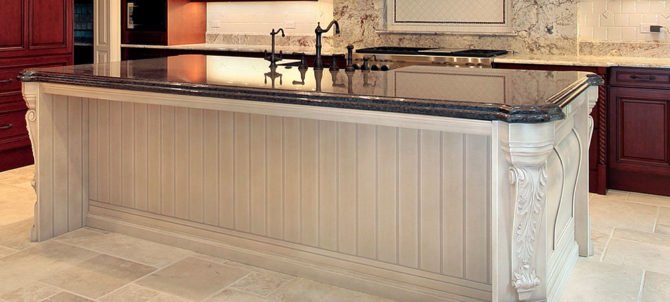
On a casual look, black granite countertops appear tough and different from the other granite stones. And due to this, you will hear many homeowners asking, does black granite need to be sealed?
The truth is other than the color, there is nothing unique about black granite counters, so you will need to seal them like any other granite counters.
How does the granite sealant work?
Also known as an impregnator, the granite sealant is made of a resin dissolved in water or petroleum-based solvent. When you apply it on the porous granite surface, it creates a film that gets to the inner layers of the stone and fills the pores, and when the solvent or water evaporates from the mixture, the resin hardens, creating a tough barrier that liquids, dirt, bacteria and other materials can’t easily pass through.
Upon properly sealing the countertops, you keep the spills on the surface, which gives you time to clean the surface before the liquids can seep into the stone and stain it.
Although the granite sealant creates an effective barrier, it’s not foolproof. This means that if you leave liquids on the countertops long enough, they will seep through the resin barrier and stain your expensive countertops. To prevent this from happening, make it a habit to wipe off the spills as soon as they happen.
How often should you seal the countertops?
For maximum protection, seal the surfaces at the time of installation, then every six months to one year thereafter. Sometimes you may seal the surfaces more frequently if you use the counters more frequently.
You should note that even with frequent sealing, you shouldn’t let the liquid spills stay on the countertops in the event of a spillage. Instead, move with haste and get rid of them immediately before they start seeping into the deeper layers.
Besides getting rid of spills, also make it a habit to clean granite countertops regularly. And you don’t have to be fancy about it. A simple washcloth or sponge and a gentle soap and water will get it done.
After cleaning the surfaces, dry them thoroughly with a clean, dry towel. Regardless of how clean you want the countertops to be, don’t use harsh abrasives or acidic solutions as they will dull and scratch the surfaces instead.
It’s common for bacteria to adhere to the countertop pores. To prevent the bacteria from getting to your food, make it a habit to disinfect the surfaces at least once a week.
There are plenty of granite disinfectants in the market you can use, so avoid using bleach and other chemicals to disinfect the countertops. If you have to use bleach, dilute it enough, then rinse it thoroughly after application.
Even with the best care, it’s common for stains to happen. When they come about, remove them using a baking soda and water paste and gently rub it into the stain using a soft cloth. For stubborn stains, you may have to repeat the process a few times.
Who should apply the sealant?
Although you can apply the sealant by yourself and protect your countertops, avoid doing the work, especially if you have never done it before. Instead, let a professional help you out.
An experienced contractor will apply the sealant evenly, so it covers the entire surface from all sides. The contractor will also recommend the best sealant for the work.
Like other products in the market, there are many types of sealants you can go for. For the sealer to protect your countertops for a long time, you need to ensure its high quality and doesn’t contain any harsh chemicals that can cause irritation or emit strong odors.
Avoid any sealer containing harsh chemicals that might damage the countertops. An ideal sealant should be high quality and gentle enough, so you don’t have to worry that the granite contractors NC you hired will get hurt when applying it.
A good quality sealer will also provide you with the liquid, dirt, and bacteria protection you are looking for. The sealer also won’t give off an offensive smell after application making your house uncomfortable to live in.